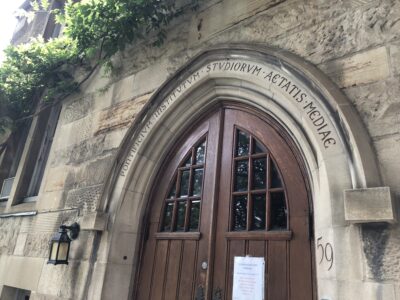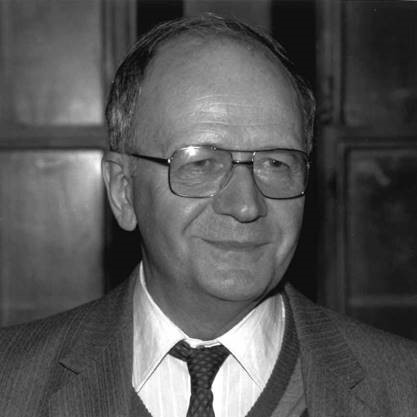Jacqueline Murray has been a Professor of History at the University of Guelph since September 2001, where she was also Dean of Arts. Previously she was a member of the Department of History at the University of Windsor. In 1987, Jacqueline graduated from the University of Toronto with a Doctor of Philosophy in Medieval Studies. Her research specializes in sex, gender, and sexuality, masculinities and embodiment, as well as marriage and family in premodern Europe. She is a Visiting Fellow at St Michael’s College from 2022-2024.
My first connection to St Mike’s started even before I arrived in Toronto. As an undergrad at UBC, I became fascinated with the Middle Ages. Medieval history became a huge part of my life, my passion and eventually my vocation. In those days, medieval history revolved around kings and popes; politics and religion. Then, Father Michael Sheehan from the Pontifical Institute of Mediaeval Studies (PIMS) visited UBC and delivered a series of lectures about the lives of ordinary medieval people, and particularly about marriage and the family.

He opened my eyes to a completely new approach to the study of the Middle Ages and I knew I wanted to be part of it. This was in the 1970s when feminism was challenging society and women’s history was just emerging. I wanted to integrate these important perspectives into my study of the Middle Ages, so I decided to do my honours thesis on how women were treated in a medieval law code. I had the chance to speak with Father Sheehan about the feasibility of this research and he was encouraging. I think his endorsement helped convince my supervisor, the great political historian, Janos Bak, to let me pursue a topic that was considered rather daring at the time!
My encounter with Father Sheehan changed my life forever. I came to U of T to pursue graduate work with him and my first steps in Toronto were across the St Mike’s quad to Father Sheehan’s office. While I originally intended to follow his lead and study marriage and the family, to my surprise (and to Fr Sheehan’s!!!) the medieval sources led me in a different direction: to the church’s understanding of human sexuality. These same sources led me to my current research on medieval masculinity, a topic central to understanding the history of the Middle Ages.
I consider St Mike’s and PIMS to be an intellectual home. From my days as a graduate student, I have had the opportunity to really connect with the thriving medieval community and to hone my skills as an historian. These days, I am using a broad array of sources including hagiography, sermons, medical texts, and chronicles, in other words, historical, religious, and theological texts to explore human sexuality, masculinity, and male embodiment– that is men’s experience of having a human body that is sexed male. I am finding this research helps to illuminate medieval understandings of chastity, misogyny, and patriarchy. Because most medieval sources were written by male authors, they capture a masculine perspective on questions about being human. My research also reveals some of the foundations of our contemporary society’s ideas and values that emerge from the Middle Ages.
My work has brought me many rewarding experiences, for example, to organize and host the conference “Masculinities in the Pre-Modern World: Continuities, Change, and Contradictions,” (November 2020). Seventy-five speakers engaged with over 200 participants from around the world (thanks to Zoom). The conference demonstrated the power of technology to bridge distances, connect people, and erase the geographic and demographic limitations that have hindered scholarly collaboration in the past. It was such an exciting and enriching experience. Since then, I’ve edited two collections of essays based on the conference: Patriarchy, Honour, and Violence: Masculinities in Premodern and The Male Body and Social Masculinity in Premodern Europe. Both these books were published by our neighbours, The Centre for Renaissance and Reformation Studies at Victoria College. I am also currently working on a book, tentatively titled, Men’s Bodies, Men’s Minds: Masculinity in the Medieval West, which I hope to complete during my Visiting Fellowship at St Mike’s.
There is so much to be discovered right here on campus! My ongoing affiliation with St Mike’s will allow me to deepen my ties with colleagues and students, building on lifelong relationships while forging new academic friendships that will allow me to continue to contribute to our important on-going academic conversation.
When I think back on my journey, I remind myself that the road isn’t straight – it has unexpected twists and turns, but in life there are no wrong paths, only, as the poet Robert Frost said, “the road not taken”.
My path has led me back to my academic home at St Mike’s, a constant in my life whether as a student hanging out in the PIMS Common Room, or as a scholar retracing my footsteps to seek out such an important part of my past.
I relish and honour this homecoming and look forward to sharing it with all of you.
Read other InsightOut posts.
A new memorandum of understanding between the University of St. Michael’s College, the University of Toronto, and the Pontifical Institute of Mediaeval Studies (PIMS) heralds a renewed spirit of collaboration, says Dr. David Sylvester, President and Vice-Chancellor of the University of St. Michael’s College.
“This is much more than a piece of paper,” says Sylvester, who adds that having St. Mike’s Mediaeval Studies program, PIMS and U of T’s Centre for Medieval Studies all located in one city makes Toronto North America’s centre for research and study in the field. “[The MoU] reflects a new commitment from St. Mike’s to work with PIMS and U of T, and it opens doors to exciting possibilities for new cooperation.”
Dr. John Magee, who signed the MoU on behalf of U of T’s Centre for Medieval Studies (CMS), agrees.
“This is a starting point for future building and development,” explains Magee, who is a member of U of T’s Classics Department and the Collaborative Program in Ancient and Medieval Philosophy, as well as a Senior Fellow at PIMS. He assumes the role of Director of the Centre for Medieval Studies this coming July.
The five-year memorandum formally expresses a commitment on the part of the three signatories to work together to further engage with the mediaeval period through research, teaching, and publication. While each party remains distinct, the agreement suggests possibilities such as joint academic seminars or colloquia, as well as scholarly collaboration. It also notes that the PIMS library collection will continue to be housed in the John M. Kelly Library at St. Mike’s.
As a repository library with rare, non-circulating works, the PIMS library draws students from around the world to study everything from paleography to Latin, notes Sylvester.
Annual meetings will see the three parties discuss areas of mutual interest, opportunities for further engagement, and operational issues.
The agreement comes as the undergraduate Mediaeval Studies program, delivered at St. Mike’s as a sponsored program from Faculty of Arts and Sciences, is flourishing, and Sylvester notes that PIMs has “welcomed our undergrads with open arms,” inviting them to be part of the PIMS community.
Other natural “cross fertilization” sees PIMS’ Mellon Fellows teaching undergraduate students at St. Mike’s, for example, while PIMS has offered teaching and office space to St. Mike’s professors and students, adds Sylvester.
“This document summarizes the historic tripartite relationship between PIMS, St. Michael’s, and U of T and reflects people’s intentions going forward,” says PIMS Praeses (president) Dr. Richard Alway. “It builds on relationships in new ways and can be developed further.”
The first humanities research institute in Canada, PIMS was founded under the auspices of St. Michael’s and the Basilian Fathers in 1929, and was decreed a pontifical institute in 1939, notes Alway. From 1958 to 2005, it was a graduate school and research centre within St. Michael’s, but governance changes at the university saw PIMS establishing independent status to maintain its standing as a pontifical institute.
In addition to its world-class library, which Alway labels “a jewel, a centrepiece of our research,” and the post-doctoral Mellon Fellowships, PIMS also hosts a vibrant publishing program which produces about ten scholarly works a year, he notes, all added draws for mediaeval scholars.
“These are exciting times. St. Michael’s remains committed to undergraduate mediaeval studies, and students are attracted to what our professors and our supportive community can offer,” says Sylvester. “Our continuing goal is to build even more synergy with these important partners, precisely at this time when students and society are rediscovering the importance and the beauty of studying the humanities.”

The Pontifical Institute of Mediaeval Studies (PIMS) is mourning the death of long-time faculty member Fr. Édouard Jeauneau, who died at the age of 95 on Monday, Dec. 9, 2019 in Chartres, France.
Fr. Jeauneau was a Professor of Medieval Philosophy at PIMS and the Centre for Mediaeval Studies (CMS) at the University of Toronto from the 1975 through to 1995. He was named Institute Professor at PIMS in 1990 and was awarded an honorary doctorate in 2002.
His involvement in the medieval community in Toronto began following a formal invitation in 1974 to join the PIMS Faculty from Rev. E.A. Synan, Praeses, and Rev. James McConica, CSB, Chairman of the Search Committee.
Until 2015, he spent about eight months each year working on his many projects here in Toronto, most notably the five-volume Periphyseon of Johannes Scottus Eriugena (Turnhout: Brepols).
Fr. Jeauneau was consistently awarded substantial Social Sciences and Humanities Research (SSHRC) grants, and hired a long string of Centre students to work for him, paying them generously. He also trained many of these students in reading the particular handwriting in the manuscripts and in editing the texts.
Among the honours bestowed on him over the years was the position of Directeur de Recherche Honoraire au CNRS in Paris, France’s National Centre for Scientific Research, and an appointment as a fellow of the British Academy.
A funeral Mass will be held Monday, December 16 in his small home town of Coudray-en Perche, about 60 km from Chartres.
His presence will be missed by all who knew him.
